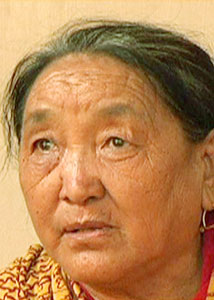Name: Dekyi
(Alias: No)
Gender: Female
Interview Age: 68
Date of Birth: 1942
Birthplace: Thoe Ngari, Utsang, Tibet
Year Left Tibet: 1961
Profession: Dairy Farming, Farming
Monk/Nun: No
Political Prisoner: No

Interview No.: 26M
Date: 2010-04-13
Language: Tibetan
Location: Doeguling Settlement, Mundgod, Karnataka, India
Categories: Culture and History
Keywords: childhood memories, Chinese -- first appearance of, customs/traditions, environment/wildlife, escape experiences, pilgrimage, refugee in India -- life as, trade, Utsang
Summary:
Dekyi was the youngest of four children. The family's occupation was farming and herding animals and they lived near to the Indian border. They faced severe water shortage during winter due to freezing temperatures and traveled far to fetch water. They used the wood of apricot trees and dung cakes as fuel. There was much work to be done all year and she had considered running away from home.
Dekyi visited India on a pilgrimage when she was 18 years old. She recounts her experience during this journey to Buddhist holy places and of seeing the disfigured people in Bodh Gaya, which many believes was the result of destroying Buddhism in their previous lives. She wished to become a nun and nearly stayed back at Varanasi instead of returning to Tibet. She thought that the Indian people seemed happier and that life was easier there.
Just 15 days after returning home from the pilgrimage, her family decided to make their escape to India. They had heard stories about Chinese atrocities in other regions and also the Chinese requested their children be sent away. After reaching Punjab in India, she worked as a coolie and then later settled in Mundgod.
Interview Team:
- Rebecca Novick (Interviewer)
- Ronny Novick (Videographer)
- Namgyal Tsering (Interpreter)

